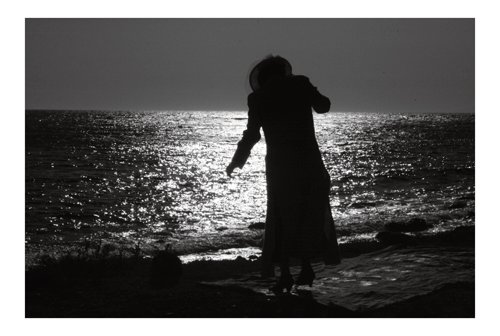Makiko Nagaya
dal 10/9/2008 al 18/10/2008
Segnalato da
10/9/2008
Makiko Nagaya
T1+2 Gallery, London
Moths to / from a Flame. In this exhibition we are confronted with work composed of overlaid materials, set out or classified in series, as if a gallery were to assume the task of providing a metaphor. Here it looks like a laboratory has been set up for staging experiments to determine something as yet unformed.

Makiko Nagaya completed her
Masters in Visual Art at Goldsmiths College to qualify as a curator in
2002. Her practice since has resisted the obligatory compromises demanded
by institutions of curating to the affirmation of art, coinciding both the
making and displaying of specific works in collaborations. This principle
is marked of an intelligence that follows certain trajectories from the
history of art and the function of the gallery or museum in their related
fields of knowledge, directed to the problem of illusion. Sustained from a
mutual interest in the early experiments of psychoanalysis, film and
fashion, these concerns also have submitted themselves to scrutiny as
remainders of, or cast-outs from the 'cocoon' of 20th Century's idealisms.
In Moths to / from a Flame we are confronted with work composed of
overlaid materials, set out or classified in series, as if a gallery were
to assume the task of providing a metaphor.
Here it looks like a
laboratory has been set up for staging experiments to determine something
as yet unformed. This is an art, the title suggests, that is drawn fatally
to the beauty of the unnamable. It is 'occult' only in so much as the
action and result of an imprecise chemistry, whose insolubility marks 'the
accidental' through invocations of ritual. The works that present
themselves at T1+2 Gallery cohere as an ordering and disordering of found
objects, sounds and pictures. Nagaya makes a detour through world history,
from Japan, Europe via the New World of late 19th Century colonialism,
dimly registered in the white noise of the past whose flickering images of
cultures are glimpsed and lost through the ensuing catastrophic flames of
the 20 th Century to emerge in new forms. The message is in the medium
applied in the Rorschach psychological test, now discredited as an
empirical tool, to a broader horizon. The typical Rorschach illusion of
capture is made by testing the fugitive, which very often is released in
the 'moth and flame' imaginary. Hermann Rorschach invented the
psychological test in 1921 based upon a children's game.
Here the
Rorschach is stretched to the topology of an audio-visual panorama
composed of serial works in painting, photography, fashion, video and
sound. For T1+2 Gallery artists Joe Banks, James Early and Johnny Vivash
will work with Nagaya from multiple sources that include sampling from
Martin Scorsese's adaptation of Edith Wharton's classic novel of late19th
Century high bourgeois society, The Age of Innocence, (1993) in which a
connoisseur's collection of Symbolist landscapes, antique Oriental
porcelains and prints constitute an important function of mirroring their
protagonist's fading illusions of prized grandeur and innocence. Nagaya
has taken the dialogue as the source for making series of 'Rorschach'
paintings. These 'sentence-images' are displayed horizontally as an index
of Rorschach tests, transforming the script into an image directly. Banks'
research into the evidences of Rorschach Audio, and Electronic Voice
Phenomena, produces affects from auditory stimuli as illusory experiences
(of which the distinction between illusion and hallucination is
important).
James Early's video works investigate film personae as a
psychological illusion of identification generated to and from the
'sympathetic magic' of the screen as if a mirror. Vivash's well-known
portrayal of characters slowly breaking down, are here tested and
subtracted from attempted tableaux vivants, posed in the manner of Kabuki
theatre. Nagaya has also invited craftspeople such as a metal welder
and seamstress to make objects from drawings in part derived from the
film. Displayed on tables fabricated in mild steel, Rorschach tests
echoing the panoramic frieze portrayed in the film, are complemented by
production photographs taken on location on the island of Patmos, where in
exile, St John the Divine wrote Revelation, arguably the ultimate tabula
rasa of meaning and nothingness. In mimicry of Warhol's Rorschach
paintings, (1984), Nagaya sets traps for interpretation. Dresses present
the sewing of an unknown seamstress; porcelain from 19th Century early
industrial productions and Japanese Imari have been set in clay; various
off-cuts of patterned silks and dyed linens collected from Japan, accrue
to present, at first glance, an archeology of frivolity.
This is a
delicate suture, or stitching, of incompatible materials and employments;
precarious, since it is the movement in one direction from utility to
inutility, and in the other, from valuable to invaluable, that coincides
the trajectories of the poetic and prosaic. Quoting Marcel Broodthears,
'What is it? In fact it is objects'. Makiko Nagaya was born in Nagoya,
Japan in 1975. She is an artist and curator, the co-director of Redux
Projects in London. Nagaya was Associate Curator of works by Japanese
artists at the 6th International Sharjah Biennial, 2003. The co-direction
of Redux (research, exhibition, documentation, urban experiment) continues
a working relationship with Peter Lewis commencing a series of 50 projects
that invites artists into specific collaborations and projects. This has
initiated various productions, exhibitions and performances, screenings
and music collaborations, which have established a new and broad
definition of the curator's role as a facilitator and artistic
co-producer.
Opening Night Thursday 11.09.08 7-9pm
T1+2 Gallery
St Matthew's Hall, 17 Hereford Street - London



